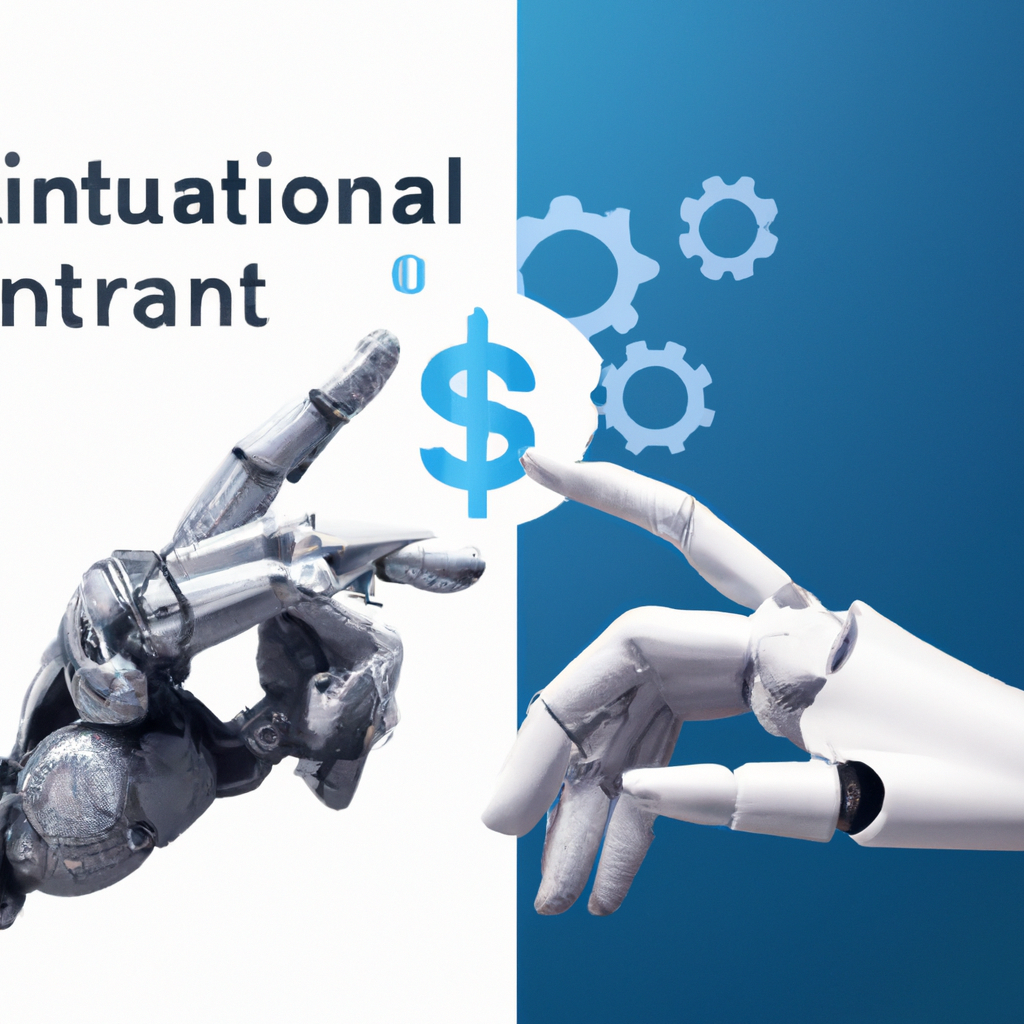You will be amazed at how AI is revolutionizing the world of finance! Artificial intelligence, or AI, is being used in various ways to streamline financial processes, analyze data, and make faster, more accurate decisions. From algorithmic trading systems that can predict market trends with incredible accuracy, to AI-powered chatbots that provide instant customer support, the applications of AI in finance are endless. In this article, we will explore the different ways AI is being utilized in the world of finance and how it is transforming the industry. Prepare to be captivated by the incredible potential of AI in finance!

This image is property of images.unsplash.com.
1. Fraud Detection
In the constantly evolving world of finance, fraud is a persistent threat. However, with the advancements in technology, specifically in Artificial Intelligence (AI), we now have powerful tools to detect and combat fraudulent activities.
1.1 Using Machine Learning Algorithms
Machine learning algorithms play a crucial role in the detection of fraud. By analyzing vast amounts of data, these algorithms can identify patterns and anomalies that indicate potential fraudulent behavior. These algorithms can learn from historical data and adapt to new fraud schemes, making them highly effective in detecting both known and unknown fraud patterns.
1.2 Real-time Monitoring
Real-time monitoring is another vital aspect of fraud detection. AI-powered systems continuously monitor transactions, looking for suspicious activities that may indicate fraudulent behavior. These systems can quickly identify and flag transactions that deviate from normal behavior, allowing financial institutions to proactively investigate and prevent fraudulent activities.
1.3 Anomaly Detection
Anomaly detection is a key technique used in fraud detection. By leveraging AI, financial institutions can identify unusual patterns or deviations from normal behavior, which are often indicators of fraudulent activities. Through the use of algorithms, AI systems can analyze transactional data, monitor customer behavior, and identify anomalies that may signify fraudulent behavior. This allows organizations to take immediate action and prevent potential financial losses.
2. Risk Assessment and Management
In the world of finance, risk assessment and management are of paramount importance. AI technologies offer immense potential to analyze big data, predict future events, and optimize portfolios while effectively managing risks.
2.1 Analyzing Big Data
Big data refers to the massive volumes of structured and unstructured data generated in the financial industry. AI algorithms can analyze and interpret this data to extract valuable insights, enabling more accurate risk assessments. By processing vast amounts of information, AI systems can identify hidden patterns, trends, and correlations that human analysis may overlook.
2.2 Predictive Analytics
Predictive analytics is a valuable application of AI in finance. By utilizing historical data and applying machine learning algorithms, financial institutions can predict future events and potential risks. These predictions enable proactive risk management, allowing organizations to mitigate potential losses and make informed strategic decisions.
2.3 Portfolio Optimization
AI-powered optimization algorithms can help financial institutions optimize their investment portfolios. These algorithms consider various factors, including risk tolerance, expected return, market conditions, and regulatory constraints, to develop optimal investment strategies. By leveraging AI, organizations can minimize risk, maximize returns, and achieve a well-diversified portfolio.
2.4 Credit Scoring
Credit scoring is a critical process in determining an individual’s creditworthiness. AI systems can analyze vast amounts of data, including credit history, financial records, and demographic information, to generate accurate credit scores. These scores help financial institutions assess the risk associated with lending funds and make informed decisions on loan approvals.
3. Trading and Investment Decisions
AI technologies have revolutionized trading and investment decisions by automating processes and providing valuable insights that can enhance profitability.
3.1 Algorithmic Trading
Algorithmic trading, also known as automated trading, involves executing trades based on pre-defined algorithms. AI-powered systems analyze market data, identify trends, and execute trades at optimal times and prices. This automation enables faster execution and eliminates human biases, leading to improved trading outcomes.
3.2 Automated Trading Systems
Automated trading systems utilize AI algorithms to execute trades based on predefined criteria and market conditions. These systems continually monitor and analyze market data, allowing for real-time decision-making. By leveraging AI, financial institutions can eliminate the need for manual trading and ensure trades are executed efficiently and with minimal human intervention.
3.3 Sentiment Analysis
Sentiment analysis is the process of extracting and interpreting emotions, opinions, and sentiments from textual data. In the financial industry, sentiment analysis enables organizations to gauge market sentiment, identify investor emotions, and predict market movements. By analyzing news articles, social media posts, and financial reports, AI systems can provide valuable insights that inform trading and investment decisions.
3.4 Market Trend Forecasting
By analyzing vast amounts of historical and real-time data, AI systems can forecast market trends and movements. These forecasts allow financial institutions to make data-driven investment decisions and capitalize on emerging opportunities. AI-powered algorithms can detect patterns, correlations, and anomalies in market data, providing valuable insights into potential market movements.
4. Customer Service and Personalized Recommendations
AI technologies have transformed customer service in the financial industry, allowing for enhanced customer experiences and personalized product recommendations.
4.1 Chatbots and Virtual Assistants
Chatbots and virtual assistants leverage natural language processing and machine learning to provide personalized customer support. These AI-powered tools can handle customer queries, provide account information, and assist with basic financial transactions. By automating customer service processes, financial institutions can improve response times, reduce costs, and enhance overall customer satisfaction.
4.2 Customer Behavior Analysis
AI systems can analyze customer behavior patterns to gain insights into preferences, needs, and financial goals. By analyzing transactional data, browsing history, and social media activity, financial institutions can develop a comprehensive understanding of their customers. This knowledge enables personalized product recommendations, tailored marketing campaigns, and improved customer engagement.
4.3 Personalized Product Recommendations
AI technologies enable financial institutions to offer personalized product recommendations based on individual customer profiles. By analyzing customer data, including transaction history, demographic information, and financial goals, AI systems can suggest suitable financial products and services. These recommendations help customers make informed decisions, improve customer satisfaction, and drive business growth.

This image is property of images.unsplash.com.
5. Loan Underwriting
AI technologies have revolutionized the loan underwriting process, improving efficiency, accuracy, and speed.
5.1 Automated Data Analysis
Loan underwriting involves the analysis of various data points to determine the creditworthiness of borrowers. AI systems can automate the analysis of financial documents, bank statements, and credit reports, streamlining the underwriting process. By eliminating manual data entry and analysis, financial institutions can save time and reduce errors, while ensuring a thorough assessment of applicant’s creditworthiness.
5.2 Risk Assessment
AI-powered risk assessment models can accurately evaluate the risk associated with lending funds. By analyzing a wide range of variables, including credit history, income stability, and debt-to-income ratio, AI systems can provide objective risk assessments. This enables financial institutions to make informed decisions on loan approvals, ensuring a balanced approach to risk management.
5.3 Speeding up Loan Approval Process
AI technologies have significantly accelerated the loan approval process. By automating document verification, data analysis, and risk assessment, financial institutions can expedite loan approvals. This speed enhances customer experience, increases operational efficiency, and allows financial institutions to respond to loan applications in a timely manner.
6. Compliance and Regulatory Reporting
AI plays a crucial role in ensuring compliance with regulations and streamlining the reporting process in the financial industry.
6.1 Anti-Money Laundering
AI technologies can detect and prevent money laundering activities by identifying suspicious transactions and patterns. By continuously monitoring transactional data and leveraging machine learning algorithms, financial institutions can flag potentially fraudulent and illegal activities. This helps organizations comply with anti-money laundering regulations and ensures the integrity of the financial system.
6.2 Know Your Customer (KYC)
KYC processes require financial institutions to verify the identities of their customers. AI systems can automate identity verification by analyzing biometric data, documents, and other relevant information. This automation improves the efficiency of KYC processes, reduces manual errors, and enhances compliance with regulatory requirements.
6.3 Reporting Automation
AI technologies can automate the process of preparing compliance reports required by regulatory bodies. By analyzing vast volumes of data and extracting relevant information, AI systems can generate accurate reports efficiently. This automation reduces the burden of manual reporting, saves time, and ensures accuracy in regulatory compliance.

This image is property of images.unsplash.com.
7. Sentiment Analysis of News and Social Media
Sentiment analysis enables financial institutions to gauge market sentiment, predict stock market movements, and assess the impact of news on financial markets.
7.1 Identifying Market Sentiments
By analyzing news articles, social media conversations, and market data, AI systems can identify and measure market sentiments. This information helps financial institutions understand investor behavior, market trends, and potential impact on investments. By leveraging sentiment analysis, organizations can make informed decisions, manage risks, and capitalize on market opportunities.
7.2 Predicting Stock Market Movements
AI technologies can predict stock market movements by analyzing historical data, market trends, and investor sentiments. By using machine learning algorithms, financial institutions can identify patterns and correlations that can guide trading decisions. While stock market predictions are inherently challenging, AI-powered systems provide valuable insights that help traders and investors make more informed decisions.
7.3 Assessing Impact of News on Financial Markets
News can significantly impact financial markets, creating volatility and shaping investor behavior. AI systems can analyze news articles and social media conversations to assess the impact of news on financial markets. By identifying key events, sentiment changes, and market reactions, financial institutions can adjust their strategies accordingly, mitigate risks, and capitalize on emerging opportunities.
8. Fraud Prevention and Cybersecurity
AI technologies play a vital role in fraud prevention and strengthening cybersecurity measures in the financial industry.
8.1 Behavioral Biometrics
Behavioral biometrics leverage AI algorithms to analyze and recognize user behavior patterns. By analyzing keystrokes, mouse movements, and other behavioral attributes, AI systems can identify anomalies that may indicate fraudulent activities. This technology helps financial institutions strengthen authentication processes, detect compromised accounts, and prevent unauthorized access.
8.2 Identity Verification
AI-powered identity verification solutions enhance the accuracy and efficiency of identity verification processes. By analyzing biometric data, checking identity documents, and comparing facial features, AI systems can verify the authenticity of individuals. This technology minimizes the risk of identity theft and enhances overall cybersecurity.
8.3 Network Security
AI technologies are instrumental in enhancing network security in the financial industry. AI-powered systems can analyze network traffic data, identify suspicious activities, and detect potential cybersecurity threats. By continuously monitoring network behavior and leveraging machine learning algorithms, financial institutions can proactively protect against cyber-attacks, ensuring the security of sensitive financial information.

9. Credit Risk Assessment
AI technologies provide powerful tools for evaluating creditworthiness, predicting defaults, and optimizing debt collection processes.
9.1 Evaluating Creditworthiness
AI systems can accurately assess the creditworthiness of individuals and businesses by analyzing various data points, including credit history, financial records, and transactional data. By leveraging machine learning algorithms, financial institutions can evaluate the risk associated with lending funds and make informed decisions on credit approvals.
9.2 Default Prediction
AI-powered models can predict the likelihood of loan defaults by analyzing historical data and considering various risk factors. These models take into account customer data, economic indicators, and other relevant variables to provide accurate predictions. By identifying potential default risks, financial institutions can implement proactive measures to mitigate losses and manage their loan portfolios effectively.
9.3 Debt Collection Optimization
AI technologies can optimize debt collection processes by prioritizing accounts based on the likelihood of repayment. By analyzing customer data, payment history, and other relevant factors, AI systems can develop strategies to improve collection rates. These strategies may include personalized communication, targeted offers, and automated reminders, leading to more effective debt collection efforts.
10. Chatbots for Financial Advice
AI-powered chatbots provide personalized financial advice, automated investment recommendations, and retirement planning assistance.
10.1 Automated Investment Recommendations
AI-powered chatbots can provide personalized investment recommendations based on individuals’ financial goals, risk tolerance, and market conditions. By analyzing vast amounts of data, including market trends, historical performance, and individual preferences, chatbots can suggest suitable investment options. This technology enables individuals to make informed investment decisions and optimize their portfolios.
10.2 Retirement Planning Assistance
AI-powered chatbots can assist individuals in planning for their retirement by analyzing their financial situation, goals, and risk appetite. These chatbots provide personalized recommendations on retirement saving strategies, asset allocation, and investment options. By leveraging AI technologies, individuals can make informed choices and achieve their retirement goals.
10.3 Financial Education
AI-powered chatbots can offer financial education and guidance to individuals, improving their financial literacy and empowering them to make informed decisions. These chatbots can answer queries, explain financial concepts, and provide personalized tips and recommendations. By making financial education accessible and interactive, AI technologies contribute to the overall financial well-being of individuals.
In conclusion, AI technologies have transformed finance by enhancing fraud detection, risk assessment, trading decisions, customer service, loan underwriting, compliance, sentiment analysis, cybersecurity, credit risk assessment, and financial advice. The applications of AI continue to evolve, revolutionizing the financial industry and paving the way for more efficient, accurate, and personalized financial services.

